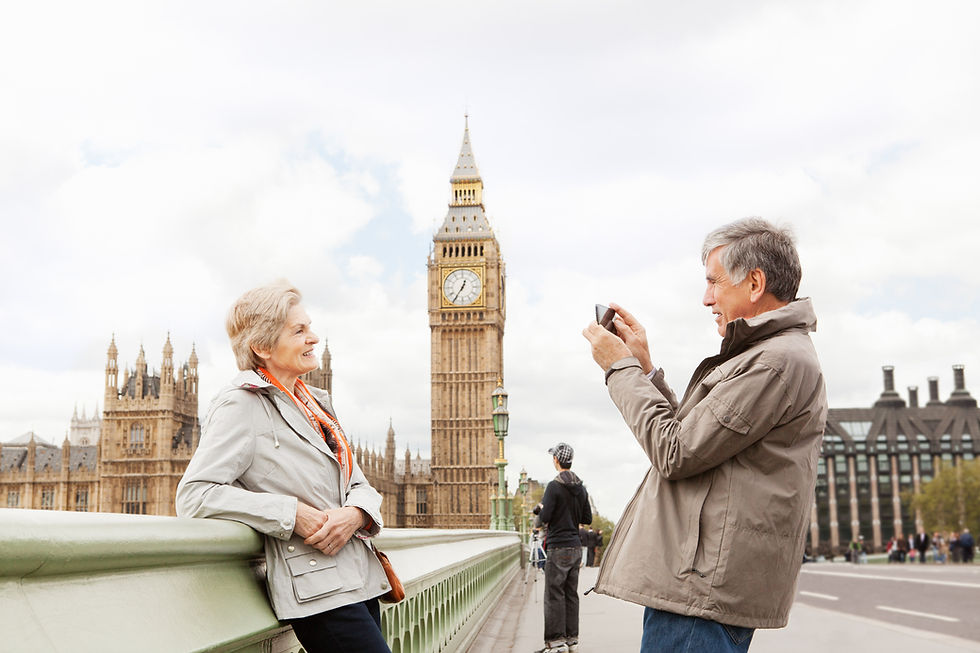Top 7 Essential Travel Health Tips for Baby Boomers to Ensure Safe Adventures
- Larry Johnson
- Jun 21, 2025
- 4 min read
Updated: Jul 3, 2025

Traveling offers a wonderful opportunity for to explore new destinations, immerse yourself in different cultures, and create lifelong memories. For Baby Boomers, retirement and flexible schedules make this the perfect time to embark on exciting journeys. However, as we age, our health needs change, making it essential to take extra precautions while traveling. By following these seven essential health tips, you can ensure your adventures are not only thrilling but also safe and comfortable.
1. Consult Your Doctor Before Traveling
Before setting off on your trip, it’s crucial to schedule a thorough check-up with your healthcare provider. Discuss your travel plans in detail, including your destination, the duration of your stay, and any activities you have planned. Your doctor can assess whether you’re physically prepared for the journey and may recommend necessary vaccinations, such as hepatitis A/B, typhoid, or yellow fever, depending on where you’re traveling. The CDC’s travel health website is an excellent resource for region-specific recommendations.
If you take prescription medications, ensure you have enough for the entire trip, plus extra in case of delays. Always carry a copy of your prescriptions and keep medicines in their original labeled containers to avoid issues at customs. If you’re planning high-altitude hikes, scuba diving, or other strenuous activities, your doctor can advise on any necessary precautions. Additionally, ask for a brief medical summary or a doctor’s note detailing any chronic conditions, such as diabetes or heart disease, in case of emergencies abroad.
2. Stay Hydrated Throughout Your Trip
Dehydration is a common issue for travelers, especially older adults, as the body’s ability to retain water decreases with age. Symptoms like fatigue, dizziness, and headaches can quickly derail your trip. To stay properly hydrated, aim to drink at least eight cups (64 ounces) of water daily, and increase your intake if you’re in a hot climate or engaging in physical activities.
It’s also wise to limit alcohol and caffeine, as they contribute to dehydration. Carrying a reusable water bottle with a built-in filter is helpful, especially in areas where tap water may not be safe to drink. Additionally, eating hydrating foods like cucumbers, watermelon, and oranges can supplement your fluid intake. A 2019 study found that 75% of adults are chronically dehydrated, leading to reduced energy and cognitive function—so make hydration a top priority during your travels.
3. Pack a Well-Stocked Health Essentials Kit

A well-prepared health kit can be a lifesaver when minor illnesses or injuries occur while traveling. Your kit should include all your prescription medications, along with backups in case of loss or delays. Over-the-counter remedies like pain relievers (ibuprofen or acetaminophen), antihistamines for allergies, anti-diarrheal medication, and motion sickness tablets are also essential.
For first-aid supplies, pack adhesive bandages, gauze, antiseptic wipes, and antibiotic ointment. Blister pads are particularly useful if you plan on doing a lot of walking. Don’t forget additional items like hand sanitizer, sunscreen (SPF 30 or higher), and insect repellent if you’re traveling to tropical destinations. If you’re going abroad, research whether your medications are legal in your destination, as some countries have restrictions on certain drugs.
4. Invest in Comprehensive Travel Insurance

Many travelers overlook the importance of travel insurance, but it’s a must—especially for Baby Boomers. A good policy covers emergency medical expenses, including hospital stays and doctor visits, as well as medical evacuation, which is critical if you’re in a remote area. It also protects against trip cancellations or interruptions due to illness or unforeseen events, and can reimburse you for lost or delayed luggage.
According to AAA, 32% of travelers faced unexpected expenses due to trip interruptions in a single year. For peace of mind, compare policies from reputable providers like Allianz, World Nomads, or TravelGuard to find the best coverage for your needs. Investing in comprehensive travel insurance ensures you’re protected against unforeseen circumstances, allowing you to focus on enjoying your trip.
5. Maintain a Balanced and Safe Diet
Trying new foods is one of the great joys of travel, but foodborne illnesses can quickly turn a dream vacation into a nightmare. To stay healthy, opt for fully cooked meals and avoid raw or undercooked meats, seafood, and unpasteurized dairy products. If you’re in a region where tap water isn’t safe, stick to bottled water and use it to rinse fruits and vegetables—or simply peel them before eating.
While street food can be delicious, choose vendors with high turnover, as this usually indicates fresher ingredients. Look for clean preparation areas and observe basic hygiene practices. Packing healthy snacks like nuts, protein bars, and dried fruit can help maintain your energy levels between meals. Researching local cuisine in advance can also help you identify nutritious options that align with your dietary needs.
6. Stay Active (But Don’t Overdo It)
Physical activity is important for maintaining energy levels and circulation, especially during long flights or road trips. Walking tours are an excellent way to explore cities while staying active. Stretching or practicing yoga can help prevent stiffness after long periods of sitting, and swimming is a great low-impact exercise that’s gentle on the joints.

However, it’s essential to listen to your body and avoid overexertion. If you have joint issues, consider using walking poles for stability on uneven terrain. The key is to incorporate movement into your travels without pushing yourself too hard, ensuring you stay energized and comfortable throughout your journey.
7. Travel at a Comfortable Pace
One of the biggest mistakes travelers make is over-scheduling their itineraries. Instead of rushing from one attraction to the next, plan rest days between busy excursions to recharge. Prioritize the key sights you really want to see, and don’t be afraid to take breaks—whether it’s sitting at a café, enjoying a park, or simply people-watching.
Remember, travel is about experiences, not checking off every tourist spot on a list. Slowing down allows you to fully appreciate your surroundings, reduces stress, and makes for a more enjoyable and memorable trip.
Final Thoughts
Traveling as a Baby Boomer should be about joy, discovery, and relaxation—not health worries. By following these seven essential tips, you’ll be well-prepared for a safe and fulfilling adventure. Whether you’re cruising through Europe, exploring tropical beaches, or road-tripping across the U.S., prioritizing your health ensures you can make the most of every moment.
**Where will your next journey take you?** 🌍✈️ Happy and safe travels!

Comments